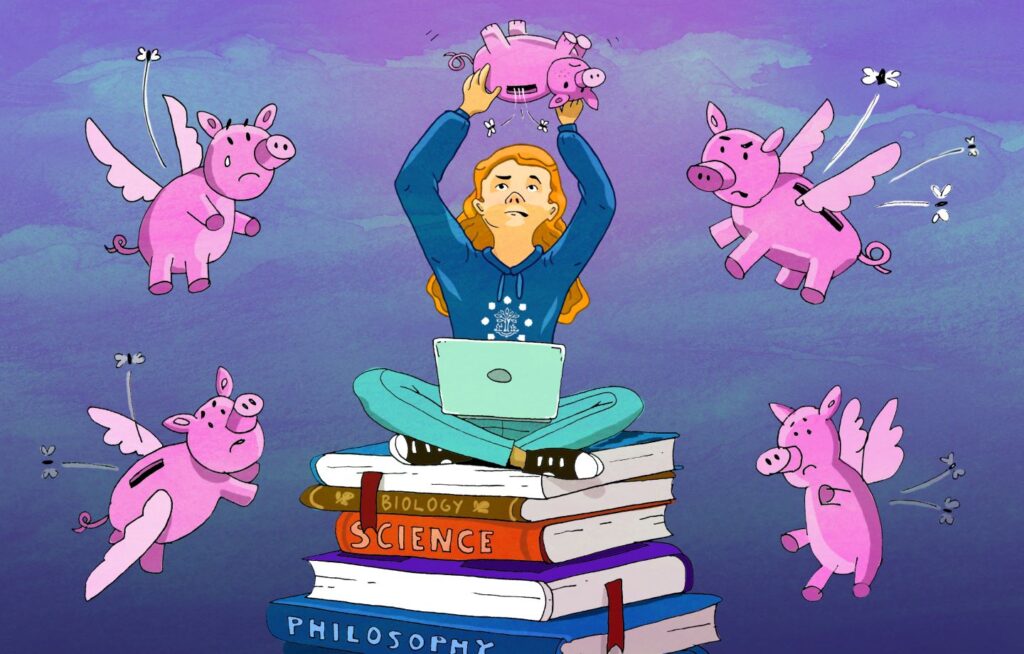Students Feel Less Ashamed About Financial Struggles
Students often have little money to spend. But do they also worry about money? And how does it affect you when the bills start piling up? ‘Financial problems can hit harder than a punch to the head.’

At the back of the kitchen cupboard sits a bag of beans from your Christmas gift box. With a pack of store-brand wraps, you can prepare a meal for two euros. Fortunately, your paycheck is coming in tomorrow, although part of it will immediately go to that outstanding Klarna bill from Bol. A familiar situation for many students.
Studying takes time and energy, which often means working less. For students living away from home, rent is a monthly burden, and food and drinks still need to be paid for. But when have you simply spent too much on clothes and beer, and when are you dealing with real financial problems that weigh you down?
Financial Problems
Professor Peter van der Velden, an expert in mental health and trauma, also researches the effects of financial problems. According to him, there’s no single clear definition of financial hardship. ‘Still, in research, when people say they’re worried about money, that says a lot.’
These people usually live below the Dutch poverty line (according to NIBUD, this amount varies depending on the situation. For a single person in 2023, it was €1,510 per month, with €590 for rent and €145 for energy costs).
There are also more objective signs that a student is struggling financially and that it affects their mental health. ‘For instance, do you need to borrow money at the end of every month? Or do you have a debt you can’t repay? Especially when this goes on for a long time, it can really take a toll,’ Van der Velden adds.
Chronic Money Worries
The effect of financial stress on mental health should not be underestimated, says Van der Velden. ‘A lack of money can feel like a heavier burden than an aggressive incident, like threats or a punch in the face,’ he explains. ‘Especially when financial issues are chronic.’
However, students are less likely to experience chronic financial stress, according to Van der Velden. This is related to the phase of life they are in. ‘Choosing to study means consciously deciding to earn less for a while. It’s an investment in the future, not an immediate form of victimhood.’
Later on, students usually earn significantly more and can pay off their debts. It only becomes problematic when there’s no outlook for improvement. For a short period, you can cut back on groceries, cancel your gym membership, and go out less. But when that becomes the norm, it gets tough. Having to cancel plans again and again due to lack of money constantly reminds you of your situation.
‘People with structural financial worries wake up and go to bed with them. It takes over their lives. This affects about 6 to 7 percent of the population,’ Van der Velden explains. There are no specific figures for students.
Shame also plays a role. People with financial problems sometimes hide the fact that they go to a food bank. But among students, the shame is often less. They’re more open about running out of money because many of their peers are in the same boat.
Support from Friends and Family
And if things do go wrong? Having a support network is crucial. ‘When it comes down to it, there are often people or resources that can help. That has a positive effect on mental health. This applies not only to financial issues but to almost any problem you might face. A support system can make all the difference,’ says the researcher.
According to Van der Velden, it’s important for students to realize that other groups in society are also struggling. ‘Students are part of a privileged group.’ People with higher education levels live, on average, ten years longer and in better health. ‘I don’t want to downplay their problems, but no one is entitled to a completely carefree life. You have to keep your problems in perspective. Including student debt.’






